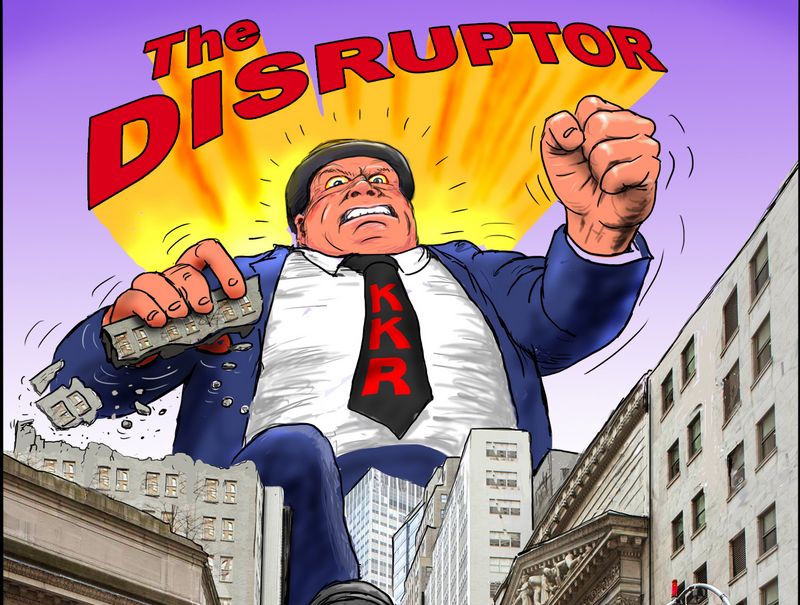A force for change:
For emerging as a disruptive and increasingly influential force in the leveraged loan market, while taking market share from established houses and leading innovation in a rapidly changing landscape, KKR Capital Markets is IFR’s Americas Loan House of the Year.
![]()
KKR Capital Markets has emerged as a disruptive force in the leveraged loan market, gaining share in the broadly-syndicated space from Wall Street’s traditional financiers, tackling some of the tough second-lien transactions and leading a marketplace that is becoming increasingly reliant on hybrid lenders that offer a full suite of funding options.
After the market wobbled at the end of 2018, the leveraged loan landscape in the US changed. An investor-base that enthused over almost any new loan instead made way for a more disciplined, selective buy-side that closely evaluated credit risk and demanded more iron-clad protection from borrowers that wanted their commitments.
As 2019 progressed, portfolio managers became increasingly wary of a cooling US economy that grappled with weaker corporate earnings, and chatter about the possibility of the US slipping into an economic recession.
Geopolitical risk, including the see-saw nature of trade talks between the US and China and the drama of Britain’s exit from the European Union, also left investors tackling a laundry list of factors that moved debt and equity markets throughout the year.
As investor sentiment shifted, borrowers, too, changed their approach to the leveraged loan market. Many no longer look just to Wall Street’s biggest banks to manage their borrowing needs and are increasingly viewing the private debt markets as a viable source of financing.
KKR has been at the forefront of this changing landscape, which is driven by a convergence of the broadly-syndicated loan market and the private credit market. Since 2016, KKR has grown its volume of sole, or left-lead, mandates from 10 in 2016 to 24 in 2019.
The firm has also increased its workload with sponsor-backed financings that are not affiliated with its own private equity shop. KKR was the sole lead on six transactions in 2016 for loans backing non-KKR buyout deals, but that has risen to 15 in 2019.
KKR has also shined in the second-lien market. These riskier tranches of money have become harder to syndicate among a skittish investor-base and borrowers have been turning to private placements to allocate this debt.
KKR has pre-placed nine second-lien loans in 2019, including a US$210m facility that supported KKR’s leveraged buyout of Australian snack food company Arnott’s in October and a US$225m second-lien loan supporting Siris Capital’s acquisition of digital printer Electronics for Imaging in July. KKR also led deals in the US for Thoma Bravo, HIG Capital and Genstar in 2019, proving that the business can not only coordinate deals for its own investments, but for its competitors too.
“It is unique for a sponsor to defer to someone who historically has been deemed a competitor,” said Josh Lederman, a director with KKR Capital Markets.
KKR offers a broad array of lending options and is well positioned to continue growing its market share in the leveraged financing space in the years to come.
“We compete with everybody, but there is no one person that competes with us in everything,” said Adam Smith, the head of capital markets at KKR. “We’re competing against the big banks, direct lenders and we finance our own transactions.”
In 2019, at least 13 loans in excess of US$500m have been arranged by direct lenders, compared to seven in 2018. And approximately 74% of second-lien loans issued in 2019 have been privately placed, up from 27% in 2018.
These market dynamics are expected to take greater shape in 2020 and KKR is positioned to continue winning business from its peers. And with mandates from the US to Australia, KKR’s global footprint serves as a timely reminder of the competitive nature of leveraged loans.
Borrowers have their pick of the litter now. No longer are banks the sole source of syndicated debt. Private equity shops with deep pockets are filling a void that regulated banks may typically avoid, and KKR’s capital markets arm offers companies the choice to tap into multiple avenues of capital.
“We are the Netflix of the financial world. It’s a new model and forces people to adapt. We are changing the way banks are responding to issuers,” said Smith.
To see the digital version of this report, please click here
To purchase printed copies or a PDF of this report, please email gloria.balbastro@refinitiv.com

